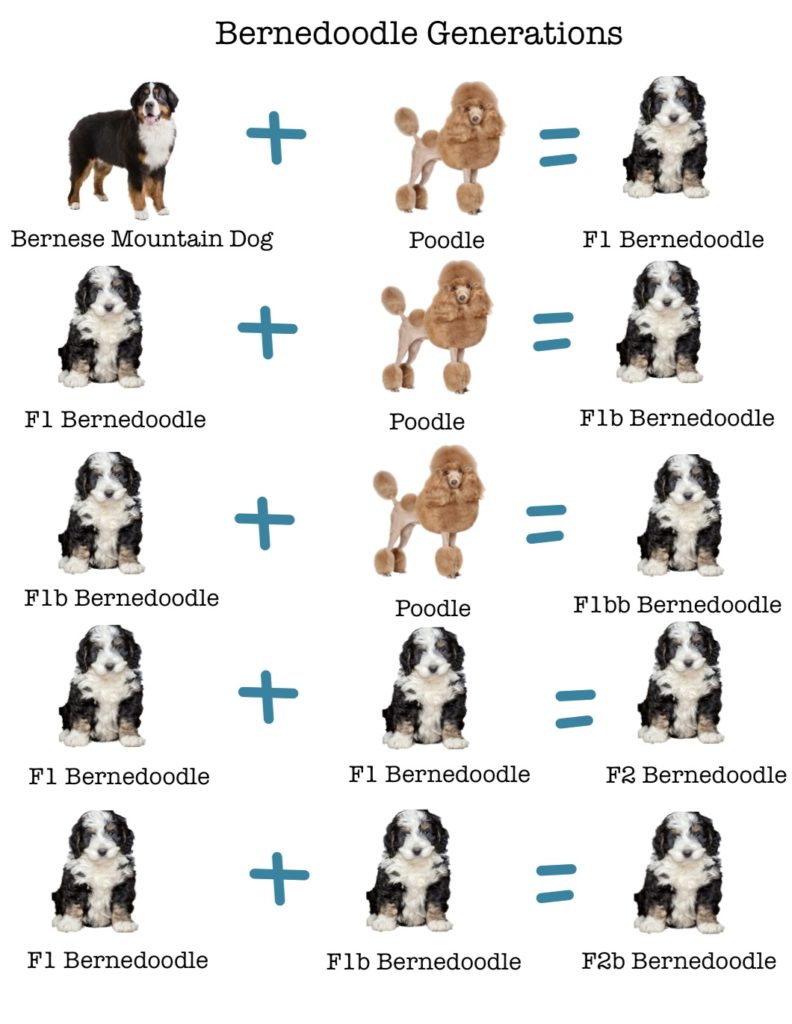The Bernedoodle is an excellent choice for families and individuals who are looking for a unique, lovable, and intelligent companion. With its allergy friendly coat*, playful personality, and adaptability, the Bernedoodle is a great choice for those who are looking for a dog that will fit in with their lifestyle and bring joy and love into their lives. So, if you’re considering adding a Bernedoodle to your family, we hope this page will provide you with some of the information you need to make an informed decision.
* Allergies are unique to each individual, some may be allergic to a pets dander, the fur or the saliva – there is never a guarantee that any dog will be 100% hypoallergenic for everyone.
Origin
The Bernedoodle is a designer dog breed that was created by breeding a Bernese Mountain Dog with a Poodle. The first Bernedoodles were bred in 2003 by Sherry Rupke of SwissRidge Kennels in Ontario Canada and have since become a popular choice for families and individuals looking for a unique and lovable companion.
Bernedoodle Generations

F1 Bernedoodle = 1st generation, one parent is a Bernese Mountain Dog & the other parent is a Poodle (50% Bernese Mountain Dog 50% Poodle)
- Coat Type: Unknown (Straight, Wavy, or Curly)
- Hypoallergenic: Variable.
- Non-shedding: Variable.
F1b Bernedoodle = F1 Bernedoodle back bred to a purebred Poodle (25% Bernese Mountain Dog 75% Poodle) – highly sought after due to the increased likelihood of being hypoallergenic
- Coat Type: Wavy or Curly coat.
- Hypoallergenic: Commonly hypoallergenic.
- Non-shedding: Commonly non-shedding
F1bb Bernedoodle = F1b Bernedoodle back bred to a purebred Poodle (12.5% Bernese Mountain Dog 86.5% Poodle) – highly sought after due to the increased likelihood of being hypoallergenic
- Coat Type: Wavy or Curly coat.
- Hypoallergenic: Commonly hypoallergenic.
- Non-shedding: Commonly non-shedding
F2 Bernedoodle = 2nd generation, both parents were F1 Bernedoodles (50% Bernese Mountain Dog 50% Poodle)
- Coat Type: Extremely variable and unpredictable. Straight, wavy, or curly.
- Hypoallergenic: Uncertain.
- Non-shedding: Unpredictable
F2b Bernedoodle = 2nd generation Bernedoodles bred to a purebred Poodle (37.5 Bernese Mountain Dog 62.5% Poodle)
- Coat type: Wavy or Curly.
- Hypoallergenic: More than likely. However, there are certainly exceptions.
- Non-shedding: More than likely. However, there are certainly exceptions
Bernedoodle Sizes
- Tiny – stands between under 17 inches and weighs 5 – 20 pounds
- Mini / Medium – stands between 18-24 inches and weighs 20 – 49 pounds
- Standard – stands between 23-29 inches and weighs 45-90 pounds (based on parents’ weight)
Characteristics
There are a few key characteristics that are common to most Bernedoodles, including:
- Allergy Friendly Coat: One of the most attractive features of the Bernedoodle is its allergy friendly coat, which is a result of the Poodle parentage. * Allergies are unique to each individual, some people may be allergic to a pets dander, the fur or the saliva – there is never a guarantee that any dog will be 100% hypoallergenic for everyone.
- Intelligence: Bernedoodles are highly intelligent dogs that are known for their trainability.
- Playful Personality: Bernedoodles are known for their playful and affectionate personalities.
- Social: Bernedoodles are highly social dogs that love to be around people. They do well in families and are also good with children and other pets.
- Energetic: Bernedoodles are energetic dogs that love to play and run around. They need daily exercise and training.
- Life Expectancy: 12-18 years
Puppy Care
Feeding
When it comes to feeding your Bernedoodle puppy, it’s crucial to provide them with a balanced diet that meets all of their nutritional needs. As a general rule, puppy food should consist of high-quality proteins, complex carbohydrates, and essential fatty acids.
When choosing a puppy food brand, look for one that is made with all-natural ingredients and does not contain any artificial preservatives or additives. Additionally, consider feeding your puppy smaller, more frequent meals throughout the day to help regulate their digestion and prevent overeating.
Grooming
Bernedoodles have a unique coat that requires special attention, so it’s essential to start grooming them at an early age. Grooming your Bernedoodle puppy regularly will not only keep their coat healthy and shiny, but it will also help you bond with them and strengthen your relationship.
To get started, invest in a good quality brush, comb, and shampoo. Brush your Bernedoodle puppy’s coat regularly to remove any tangles or mats and to distribute their natural oils evenly. In addition to brushing, bathing your Bernedoodle puppy once a month using a gentle, pH-balanced shampoo can help keep their skin and coat healthy.
Training
Training your Bernedoodle puppy is an essential aspect of puppy care that can help them become a well-behaved and well-adjusted member of your family. When training your Bernedoodle puppy, it’s important to use positive reinforcement techniques, such as praise and treats, to reinforce good behavior.
To get started, consider enrolling your Bernedoodle puppy in a basic obedience class, or consider working with a professional dog trainer. In addition to obedience training, it’s also important to socialize your Bernedoodle puppy from an early age to help them get used to new experiences and people.
